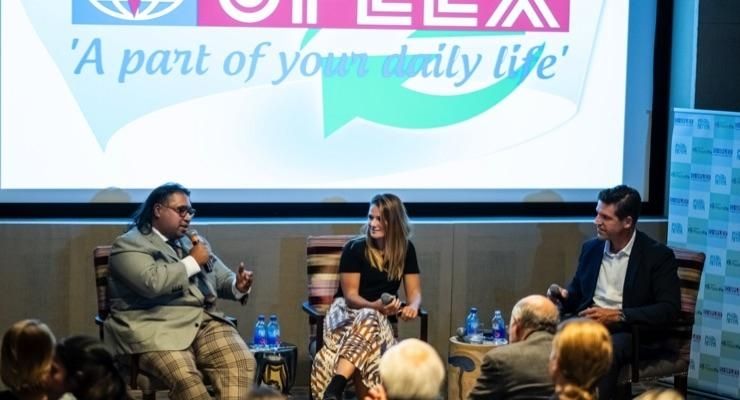UFlex and Plastic Patrol, an international movement that combines crowdsourcing and
community activ-ism to address single-use plastic pollution, recently screened the short
documentary “The Hudson Project” at the Core Club in New York City.
Along with the film screening, the event highlighted the importance of open and
productive conversa-tion around plastic pollution to help identify solutions; included a
panel discussion between Anantshree Chaturvedi, vice chairman and CEO of FlexFilms
International and environmentalist Lizzie Carr, founder of Plastic Patrol; and announced
the launch of UFlex Group’s new global initiative, “Project Plastic Fix.”
According to Carr, in just the last two years, Plastic Patrol has conducted hundreds of
cleanups, reach-ing thousands of people globally and removing more than 320 ton bags of
trash from the natural world.
“The Hudson Project” follows her 170-mile paddle boarding expedition to draw attention
to plastic pol-lution in America. Carr is dedicated to using her journeys to capture
important data that educates the public on environmental issues and informs industry and
government to find solutions to tackling the plastic crisis.
“We are just scratching the surface by litter picking,” Carr said.
Through the Plastic Patrol app, trash collected on Plastic Patrol cleanups is documented
and catego-rized. All data is analyzed by partner sciences to inform and develop solutions
to the pollution problem.
What started as one person has become a global community, said Carr. In fact, the Plastic
Patrol app now has more than 250,000 pieces of garbage logged across 68 countries.
“Community is at the heart of Plastic Patrol and that’s what we are building, a like-minded
community of people that truly care about this issue which ultimately is what will drive
change,” Carr noted. “This is a global problem that requires global change – and this has to
come at every level including industry and government. One person can make a difference
but it will take systemic change to solve the problem.”
“Lizzie is trying to eradicate single use plastic from nature – where it isn’t supposed to be,
and as a plas-tics manufacturer, we are trying to achieve the same goal of making our
environment plastic-free,” said Chaturvedi. “We believe that plastic is a problem that can
be solved – it’s a global catastrophic risk that we can put behind us, but we have to
engineer ourselves out of the problem. Although it’s a challenge, there are avenues, but
technology alone isn’t enough. It will take a combination of technology, plastic and people
to solve this problem. Corporate choices and citizen behavior are part of the solution.”
To that end, UFlex has launched Project Plastic Fix, a pioneering sustainability initiative
designed to clean up plastic waste and convert it into products that have an economic
value.
UFlex will eradicate plastic waste in four distinct ways through a mix of various
methodologies it already practices. These include recycling plastic waste into granules to
make more than 10,000 household and industrial products like road dividers, outdoor
furniture, dustbins and many more useful articles; re-processing plastic waste into fuel
through a process called pyrolysis that emits zero greenhouse emission; collecting and
converting plastic bottle waste into green, up to 100% PCR grade packaging film As-
clepius; and converting plastic waste into 100% biodegradable biomass.
UFlex’s Project Plastic Fix is the only project in the world that shall have the technology to
make plastic recyclable as well as biodegradable.
Also making Project Plastic Fix unique and different is that waste collection will be done
by individuals directly engaged by UFlex, thus eliminating the “middleman” that typically
would see the largest benefit from these transactions. Project Plastic Fix contributes to
poverty alleviation as the person responsible for collecting and depositing the waste,
receives the maximum return. To this, Chaturvedi commented, “Waste collection is more
about economic value. When we think of waste management as an unimportant thing, it
becomes a burden on all those who have to deal with it.”
The initiative is being piloted in India, Poland and Mexico. UFlex will be looking at
additional locations along the US East Coast and in the UK later.
“I believe that while plastic cannot be removed from everyday living, it can be used
responsibly. We can have a solution to use the plastic that the world has already
manufactured and ensure that it gets recycled and reused in the economy, in a variety of
ways, without affecting the ecology,” added Chaturvedi. “Project Plastic Fix advocates the
message that the problem of plastic is fixable, achievable and there will come a time when
we will look back and not believe that this problem ever existed.”
Emphasizing the issue of human behavior that adds to the plastic waste menace,
Chaturvedi concluded, “A change in the way the consumer thinks and behaves will make a
lot of difference. With Project Plastic Fix, the only requirement from the consumer will be
waste sorting, while the rest can still be addressed with UFlex’ four different approaches.
Just by making a small little effort of segregating our waste before disposing it, makes it a
lot simpler for companies like ours to make sure all plastic waste falls right place. But
these changes by consumers need to be made today.”
Source: UFlex
Packaging 360 is a comprehensive knowledge sharing ecosystem for the Indian packaging industry. Our services include an online content platform to deliver news, insights and case studies; organising conferences seminars and customised training; Providing Bespoke Project Consulting, Market Research and Intelligence.







